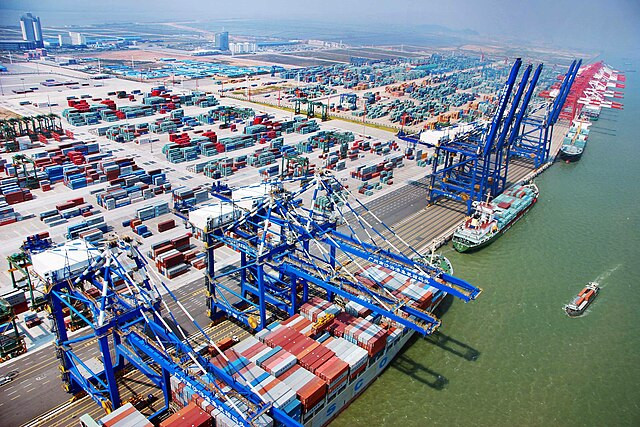Imports from China to the United States are plummeting amid escalating trade tensions, as President Donald Trump's sweeping 145% tariffs on Chinese goods bring trans-Pacific cargo traffic to a standstill. U.S. retailers and logistics firms are warning of impending product shortages, rising prices, and layoffs if the disruption persists.
Container bookings from China to the U.S. dropped by as much as 60% since early April, according to Flexport, a major freight logistics company. At the Port of Los Angeles, which handles a large share of U.S.-bound Asian cargo, shipments fell 10% year-over-year last week and are expected to decline 35% in the coming weeks, port executive director Gene Seroka said.
"Essentially all shipments out of China for major retailers and manufacturers have ceased," Seroka told the Los Angeles Board of Harbor Commissioners on April 24. Retailers had previously rushed to import goods ahead of the tariff hikes, but the sharply increased duties have made many imports commercially unviable.
The drop comes during what is typically a peak shipping period for back-to-school and fall retail cycles. Nathan Strang, director of ocean freight at Flexport, said this is "normally when bookings increase," but the tariff-induced freeze has instead led carriers to cancel 25% of sailings from China. Ocean container rates have collapsed from $8,100 last July to $2,327, according to Freightos.
Major U.S. retailers including Walmart and Target privately warned Trump that his tariff regime could soon lead to empty shelves. "We had a productive meeting with President Trump and his team," Walmart said. Target added it remained "committed to delivering value for American consumers," but noted rising costs.
Freight disruptions are already impacting small businesses. Kristin Bear, owner of lingerie brand Kilo Brava, said she may be forced to abandon goods in China and shut down her company. Kevin Brusky of APE Games said he has 7,000 tabletop games stuck in a Chinese warehouse and may need to launch a Kickstarter campaign to cover the tariff costs.
Jay Foreman, CEO of toy company Basic Fun, paused shipments of Tonka trucks and Care Bears, warning, "Consumers will find Basic Fun toys in stores for a month or two but very quickly we will be out of stock."
The effect on U.S. consumers is expected to deepen as inventory stockpiles dwindle. The top five product categories moving through the Port of Los Angeles-furniture, auto parts, clothing, plastics, and footwear-are among those most exposed.
Torsten Sløk, chief economist at Apollo Global Management, warned that tariffs will result in "COVID-like shortages for consumers and for firms using Chinese products as intermediate goods." He predicted a 90% chance of recession this summer if the tariff regime holds.
Economic sentiment has already taken a hit. The Conference Board reported that consumer confidence fell for the fifth straight month in April, reaching its lowest point since the early pandemic period. One-third of Americans expect hiring to slow, matching levels from the Great Recession.
Business investment is also slowing. Naveen Jaggi, president of retail advisory services at JLL, said retailers are delaying expansion plans, waiting to assess consumer behavior. Meanwhile, first-quarter GDP is forecast to have slowed to 0.8%, down from 2.4% in the prior quarter, as front-loaded imports widened the trade deficit.






